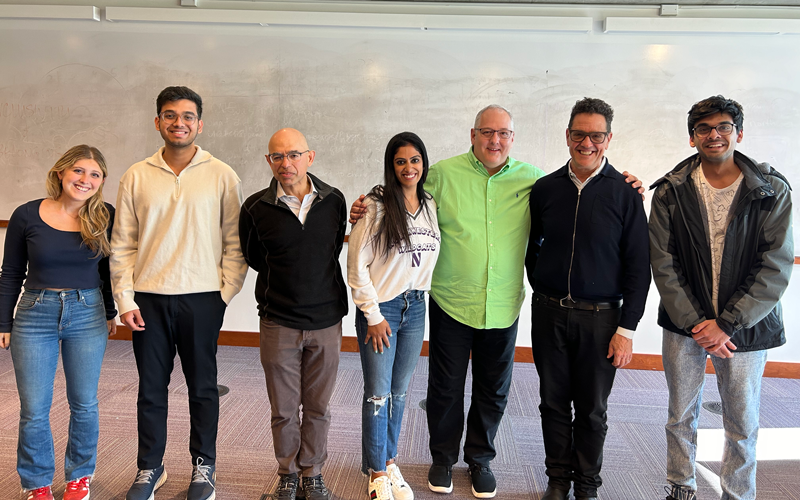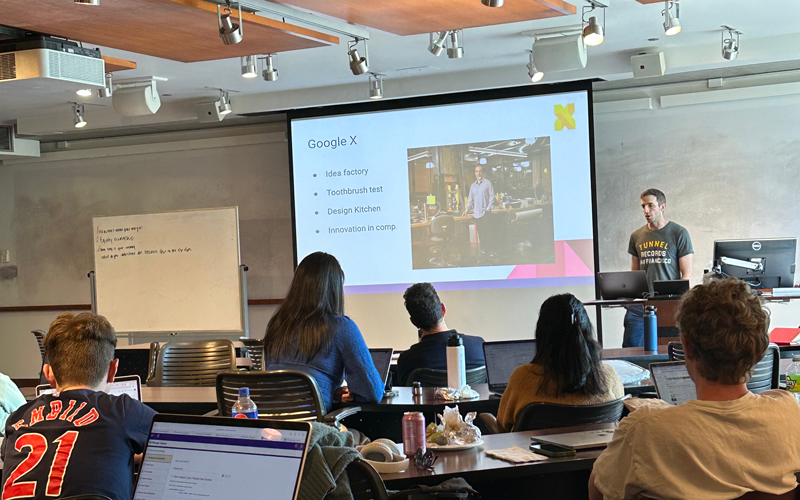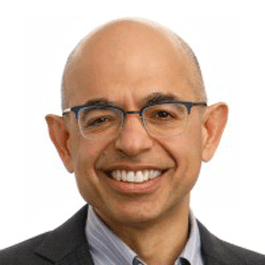When Big Businesses Act Like Startups
In the Farley Center’s new Corporate Innovation course, students discover how the entrepreneurial mindset can – and does – live in larger enterprises.

For Northwestern University fourth-year student Stephanie Shields, timing is everything.
A political science major also pursuing a minor in entrepreneurship at the Farley Center for Entrepreneurship and Innovation, Shields relished previous Farley courses detailing the skills and strategies smaller startups employ in the pursuit of growth. Innovation excited her, as did the thrill of building something from scratch.
With graduation nearing, however, Shields felt unease alongside a pinch of frustration. With a job at a bigger, established company awaiting her, Shields worried she would soon be abandoning entrepreneurship and the energetic vibes it delivered.
Fortunately, a new Farley Center course arrived just in time to assuage Shields’ concerns and highlight invigorating possibilities.
Guided by instructors Sailesh Chutani and Todd Warren, Shields and 24 students from across Northwestern – undergraduate and graduate students representing different colleges, schools, and disciplines – investigated the innovation strategies of large enterprises this spring in the debut session of ENTREP 395: Corporate Innovation.
Innovating from within
Chutani and Warren, two seasoned professionals with extensive corporate innovation experience, began the course by walking students through different innovation frameworks and case studies. Thereafter, they tasked students to analyze the innovation strategies of established corporations by using publicly available materials. Finally, students began contacting employees at public companies to examine the diverse drivers of corporate innovation, from internal incubator processes to acquisitions, as well as the various business models corporations employ to seize compelling opportunities.
 “Students did impressive work analyzing how these businesses worked and how they approach innovation, whether it was understanding novel tech at Moderna or diving into the breadth of business at a company like Boeing,” said Warren, an adjunct faculty member at the Farley Center who previously initiated new businesses at Microsoft and spearheaded vehicle software development at the Ford Motor Company.
“Students did impressive work analyzing how these businesses worked and how they approach innovation, whether it was understanding novel tech at Moderna or diving into the breadth of business at a company like Boeing,” said Warren, an adjunct faculty member at the Farley Center who previously initiated new businesses at Microsoft and spearheaded vehicle software development at the Ford Motor Company.
Along the way, Warren and Chutani, a visiting fellow at the Farley Center who guided innovative efforts at companies such as Amazon, Oracle, and Logitech, hosted five guest speakers with corporate innovation experience. The speakers shared thoughts on how larger companies embrace the entrepreneurial mindset, overcome regulatory hurdles, usher innovations to market, and create cultures supporting innovative projects. Speakers included:
- Nick Renold ’11, who works on Google’s drone delivery initiative, Project Wing
- Prashanthi Raman ’04, who directed policy and government affairs at both Cruise and Lyft
- Jeff Henshaw, a member of the Xbox founding team at Microsoft
- Swatee Surve, who led product innovation for new health and wellness services in companies such as T-Mobile, Nike, Kodak, and Microsoft
- Anoop Prakash, a former Harley-Davidson executive responsible for steering the brand’s ambitious market entry into India

“With our speakers, we were able to show the many dimensions of entrepreneurship at corporations and how innovation can and does take shape at larger corporations,” Chutani said, adding that he and Warren opened up their speakers’ programs to the broader Northwestern community knowing many students seek entrepreneurial insights and guidance.
Showing the possibilities
Knowing entrepreneurship classes often focus on the startup space, Asher Bank, a fourth-year student majoring in data science, took the inaugural Corporate Innovation course eager to understand entrepreneurial activities at established organizations, particularly enterprises that might not seem entrepreneurial at first glance.
“When you hear of entrepreneurship, you often think of the startup with five employees, but this class pushes that notion,” Bank said. “It has shown me how different companies are emphasizing the entrepreneurial spirit internally and using it to be innovative and growth oriented.”
As Bank will start a position in August with BlackRock, one of the world’s largest asset managers and private equity firms, he appreciates Chutani and Warren sharing their own experiences in industry and pushing students to see how innovation applies in the corporate landscape.
“Now, I see how I can do this and how it’s been done before,” Bank said.
That was something both Chutani and Warren hoped students would recognize and value.
 “We wanted to provide students a fairly structured and powerful toolbox to not only evaluate companies and the opportunities they might have to be entrepreneurial as employees, but also to assess how they can elevate their odds of success if they’re working on an innovative project within a larger corporation,” Chutani said.
“We wanted to provide students a fairly structured and powerful toolbox to not only evaluate companies and the opportunities they might have to be entrepreneurial as employees, but also to assess how they can elevate their odds of success if they’re working on an innovative project within a larger corporation,” Chutani said.
As for Shields, who was once concerned she’d be parking her entrepreneurial pursuits upon entering the professional world, the Corporate Innovation course proved inspiring. It demonstrated different ways in which innovation manifests itself in larger, established businesses and provided optimism she might pursue innovative activities in her professional life.
“It has been fascinating to see all the different ways a big corporation can invest in innovation as opposed to suppressing it,” Shields said. “I hope I can work for teams that invest in innovation, regardless of the size of the company.”
That’s not something Shields could’ve said just a few months ago.
